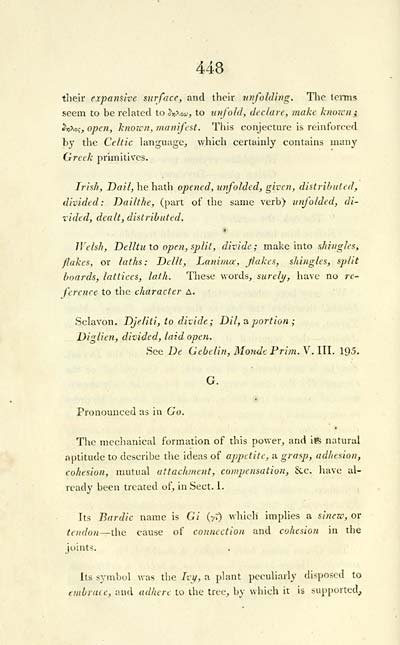Blair Collection > Celtic researches, on the origin, traditions & language, of the ancient Britons
(542)
Download files
Complete book:
Individual page:
Thumbnail gallery: Grid view | List view

448
tlieir expansive surfnce, and their unfoìdìììg. The teiins
seem to be related to in>.ou, to unfold, declare, make known;
^■ηλος, open, known, manifest. This conjecture is reinforced
by the Celtic language, Avhich certainly contains many
Greek primitives.
Irish, Dail, he hath opened, unfolded, given, distributed,
divided: Dailthe, (part of the same verb) unfolded, di-
vided, dealt, distributed.
Welsh, Delltu to open, split, divide ; make into ahingles,
flakes, or laths: Dellt, Lanima-, fakes, shingles, split
hoards, lattices, lath. These words, surelt/, liave no re-
ference to the character Δ.
Sclavon. Djeliti, to divide; Dil, Ά portion ;
Diglien, divided, laid open.
See De Gebelin, Mojide Prim. V. III. IQó.
G.
Pronounced as in Go.
The mechanical formation of this power, and ift natural
aptitude to describe the ideas of appetite, a grasp, adhesion,
cohesion, mutual attachment, compensation, 8cc. have al-
ready been treated of, in Sect. 1.
Its Bardic name is Gi {y7) which implies a sinew, or
tendon — the cause of connection and cohesion in the
joints.
Its symbol was the Ivif, a plant peculiarly disposed to
enibrnic, and adhere to the tree, bv which it is supported.
tlieir expansive surfnce, and their unfoìdìììg. The teiins
seem to be related to in>.ou, to unfold, declare, make known;
^■ηλος, open, known, manifest. This conjecture is reinforced
by the Celtic language, Avhich certainly contains many
Greek primitives.
Irish, Dail, he hath opened, unfolded, given, distributed,
divided: Dailthe, (part of the same verb) unfolded, di-
vided, dealt, distributed.
Welsh, Delltu to open, split, divide ; make into ahingles,
flakes, or laths: Dellt, Lanima-, fakes, shingles, split
hoards, lattices, lath. These words, surelt/, liave no re-
ference to the character Δ.
Sclavon. Djeliti, to divide; Dil, Ά portion ;
Diglien, divided, laid open.
See De Gebelin, Mojide Prim. V. III. IQó.
G.
Pronounced as in Go.
The mechanical formation of this power, and ift natural
aptitude to describe the ideas of appetite, a grasp, adhesion,
cohesion, mutual attachment, compensation, 8cc. have al-
ready been treated of, in Sect. 1.
Its Bardic name is Gi {y7) which implies a sinew, or
tendon — the cause of connection and cohesion in the
joints.
Its symbol was the Ivif, a plant peculiarly disposed to
enibrnic, and adhere to the tree, bv which it is supported.
Set display mode to: Large image | Transcription
Images and transcriptions on this page, including medium image downloads, may be used under the Creative Commons Attribution 4.0 International Licence unless otherwise stated. ![]()
| Early Gaelic Book Collections > Blair Collection > Celtic researches, on the origin, traditions & language, of the ancient Britons > (542) |
|---|
| Permanent URL | https://digital.nls.uk/75769857 |
|---|
| Description | A selection of books from a collection of more than 500 titles, mostly on religious and literary topics. Also includes some material dealing with other Celtic languages and societies. Collection created towards the end of the 19th century by Lady Evelyn Stewart Murray. |
|---|
| Description | Selected items from five 'Special and Named Printed Collections'. Includes books in Gaelic and other Celtic languages, works about the Gaels, their languages, literature, culture and history. |
|---|

